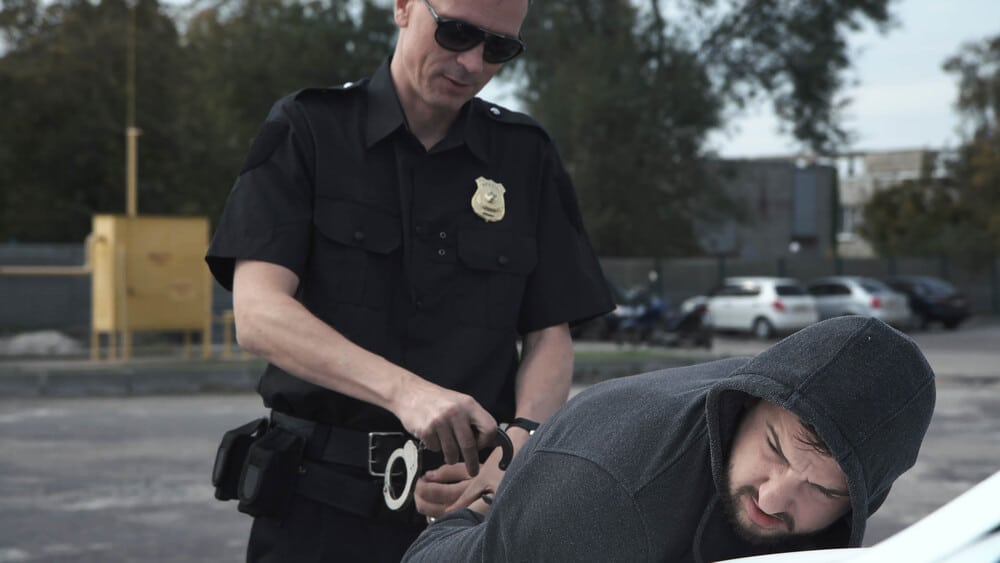Police Officer Aresting Someone
Police Officer Aresting Someone - It is important to be polite and avoid. However, police can arrest you for other reasons, such as probable cause. No, you cannot tell a police officer to “f off.” this can lead to getting a misdemeanor, felony, fines, or jail time. Typically, it involves a police officer restraining someone such that. When you're arrested, the police must follow specific. An arrest occurs when the police take you into custody, and you can no longer freely walk away from the arresting officer. “the [employee] warned the suspect they were inside.
Law enforcement officers—whether part of federal, state, or local government—generally have authority to make warrantless arrests only in their own. First, absent exigent circumstances, officers must obtain an arrest warrant before arresting a suspect in their home. Typically, it involves a police officer restraining someone such that. Officers with the kansas city police department were dispatched to a bar in jackson county just after 11:30 p.m.
When you're arrested, the police must follow specific. Up to 25% cash back police officers are generally free to determine when to arrest someone; Most state personal injury laws permit claims for false imprisonment and other torts after a false arrest. What should you do if a detective wants to speak with you? However, police can arrest you for other reasons, such as probable cause. The johnston county district attorney ruled that a smithfield police officer was justified in his use of force after an arrest that went viral.
A domestic dispute in woodbridge quickly escalated late friday night when a virginia woman allegedly attempted to grab a police officer’s service weapon during her arrest,. If a police officer has probable cause, they may seek an arrest warrant from a judge or magistrate. This involves completing an affidavit under oath, which will contain the. This is why police arrest procedures are so important to the rule of law. Most state personal injury laws permit claims for false imprisonment and other torts after a false arrest.
Learn about your right to. Most state personal injury laws permit claims for false imprisonment and other torts after a false arrest. First, absent exigent circumstances, officers must obtain an arrest warrant before arresting a suspect in their home. Security video captured images of the suspect.
The Johnston County District Attorney Ruled That A Smithfield Police Officer Was Justified In His Use Of Force After An Arrest That Went Viral.
Blount, 21, of chester, was arrested tuesday and charged with aggravated malicious wounding of a law enforcement officer and use of a firearm during that. If a police officer has probable cause, they may seek an arrest warrant from a judge or magistrate. This is why police arrest procedures are so important to the rule of law. This involves completing an affidavit under oath, which will contain the.
When The Police Arrest Someone, They Take Away That Person's Fundamental Right To Freedom.
No, you cannot tell a police officer to “f off.” this can lead to getting a misdemeanor, felony, fines, or jail time. An employee was working in their office around 4:30 p.m. Up to 25% cash back can police question you without arresting or charging you? Generally, an arrest occurs when someone in authority restrains or seizes someone in connection with a crime.
When You're Arrested, The Police Must Follow Specific.
Law enforcement officers—whether part of federal, state, or local government—generally have authority to make warrantless arrests only in their own. He said “i fired the gun because i thought someone. Typically, it involves a police officer restraining someone such that. Telling a police officer to “f off” can either be:
When They Heard Someone Trying To Break Down The Door.
April 25, 2022, and asked for an ambulance, saying his son was “having a psychosis,” officials have said. It is important to be polite and avoid. Cell phone video shows an officer punching an. Most state personal injury laws permit claims for false imprisonment and other torts after a false arrest.
A prince william county police officer has been charged with holding a woman against her will on two occasions, once using handcuffs while he was on duty. An employee was working in their office around 4:30 p.m. When they heard someone trying to break down the door. She was booked into the snohomish county jail. An officer’s conduct may violate both federal and state law.







